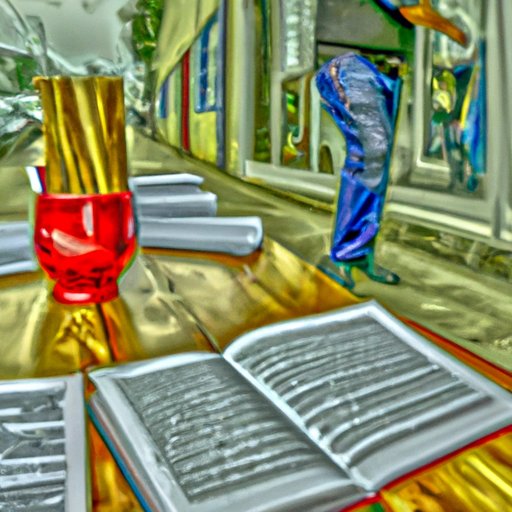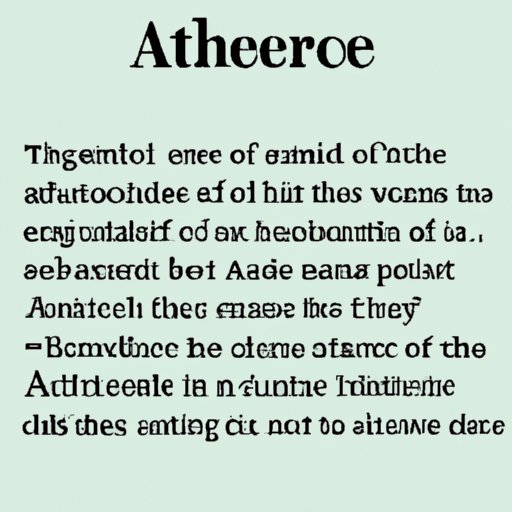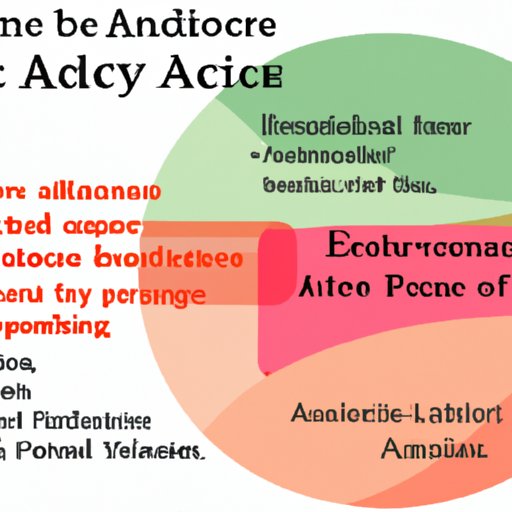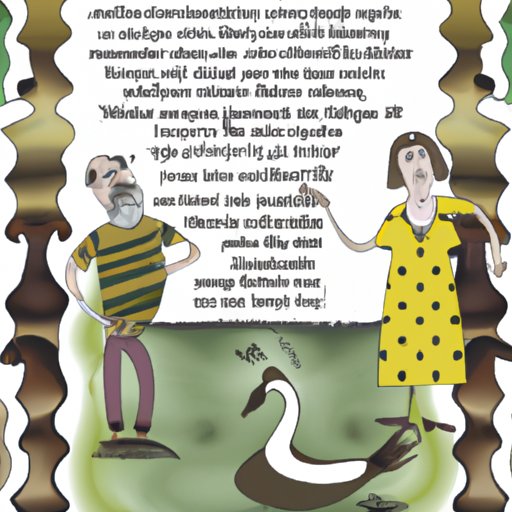Introduction
An anecdote is a brief and entertaining account of something that has happened. In literature, anecdotes are used to liven up a narrative, provide insight into characters and create humor. They can also help to capture the reader’s attention, establish a tone and add depth and dimension to a story. In this article, we will explore what an anecdote is and examine how it can be used to great effect in literature.

Exploring the Definition and Uses of Anecdotes in Literature
So, what is an anecdote in literature? An anecdote is a short and amusing story that can be used to make a point or illustrate a lesson. It typically involves a character or person who experiences something interesting or funny. Anecdotes are often used to bring life to a narrative, providing a vivid example to help the reader understand a concept or situation. They can also be used to introduce a character or provide insight into a character’s personality and motivations.
Anecdotes come in many forms. They can be humorous stories about a person’s experiences, or they can be more serious tales that offer an insight into a character’s thoughts and feelings. Anecdotes can be told from the perspective of the narrator, or they can be narrated by a character within the story. They can also be used to create suspense, highlighting a potential danger or problem that needs to be resolved.
Here are some examples of anecdotes in literature:
- In Homer’s “Odyssey”, Odysseus tells the story of his encounter with the Cyclops Polyphemus to King Alcinous. This anecdote provides insight into Odysseus’ bravery and cunning.
- In Shakespeare’s “Romeo and Juliet”, Romeo tells Mercutio the story of his unrequited love for Rosaline. This anecdote reveals Romeo’s romantic nature and helps to set up his later love for Juliet.
- In Dickens’ “A Christmas Carol”, Scrooge is visited by three ghosts who tell him stories from the past, present and future. These anecdotes show Scrooge the consequences of his selfish behavior and help him to realize the error of his ways.
- In Twain’s “The Adventures of Huckleberry Finn”, Huck and Jim tell each other stories to pass the time. These anecdotes provide insight into their characters and help to build their relationship.

How to Write an Effective Anecdote for Your Story
Writing an effective anecdote for your story requires careful planning and consideration. Here are some tips for crafting a compelling anecdote:
Brainstorming Ideas
Before you start writing, take some time to brainstorm ideas for your anecdote. Think about what kind of story you want to tell and who might be involved. Consider the setting, the characters and the plot. Ask yourself questions about the situation, such as what led up to it, how it unfolded and how it was ultimately resolved.
Crafting a Narrative
Once you have a basic idea for your anecdote, it’s time to start writing. Begin by creating a narrative structure for your story, outlining the main events and characters. Think about the beginning, middle and end of the anecdote and consider how you can use dialogue and action to bring it to life.
Creating Characters
Your characters should be believable and relatable. Give them names, personalities and motivations so that the reader can connect with them. Consider their flaws and strengths, and think about how they might react in the given situation.
Choosing the Right Setting
The setting of your anecdote should be appropriate for the story you are telling. Choose a location that is interesting and evocative, and think about how the environment might influence the events of the story.
Developing a Theme
Your anecdote should have a clear theme or message. Consider what you want the reader to take away from the story and how you can convey this message through the events and characters.
Incorporating Humor
Humor can be a powerful tool when used correctly. Think about how you can use witty dialogue, irony and sarcasm to make your anecdote lighthearted and entertaining.
Examining the Power of Anecdotes in Writing
Anecdotes can be a powerful tool in writing. Here are some of the benefits of using anecdotes in your story:
Capturing Attention
A well-crafted anecdote can grab the reader’s attention and draw them into the story. A good anecdote will make the reader want to know more about what happens next.
Engaging the Reader
Anecdotes can help to keep the reader engaged with the story. A good anecdote will make the reader care about the characters and their plight, and will make them want to find out how the story ends.
Adding Depth and Dimension
Anecdotes can be used to add depth and dimension to a story. They can provide insight into characters and help to add texture and color to the narrative.
Establishing Tone
Anecdotes can be used to establish the tone of a story. A humorous anecdote will make the reader laugh, while a more serious anecdote will make them think and reflect.
Analyzing Famous Anecdotes in Literature
Anecdotes can be found in many famous works of literature. Here are some examples of famous anecdotes in literature:
Homer’s “Odyssey”
In Homer’s “Odyssey”, Odysseus tells the story of his encounter with the Cyclops Polyphemus to King Alcinous. This anecdote provides insight into Odysseus’ bravery and cunning, and highlights his resourcefulness in the face of danger.
Shakespeare’s “Romeo and Juliet”
In Shakespeare’s “Romeo and Juliet”, Romeo tells Mercutio the story of his unrequited love for Rosaline. This anecdote reveals Romeo’s romantic nature and helps to set up his later love for Juliet.
Dickens’ “A Christmas Carol”
In Dickens’ “A Christmas Carol”, Scrooge is visited by three ghosts who tell him stories from the past, present and future. These anecdotes show Scrooge the consequences of his selfish behavior and help him to realize the error of his ways.
Twain’s “The Adventures of Huckleberry Finn”
In Twain’s “The Adventures of Huckleberry Finn”, Huck and Jim tell each other stories to pass the time. These anecdotes provide insight into their characters and help to build their relationship.
Crafting Humorous Anecdotes in Fiction
Humorous anecdotes can be a great way to lighten the mood and add a bit of levity to a story. Here are some tips for crafting humorous anecdotes in fiction:
Find the Funny
Humor can be found in everyday situations, so look for the funny side of things. Try to find the absurdity in a situation and use it to your advantage.
Use Wordplay
Wordplay can be a great way to add humor to an anecdote. Use puns, double entendres and clever turns of phrase to make the reader chuckle.
Focus on Characterization
Humor can be found in the characters themselves. Consider the quirks and eccentricities of your characters and how they might interact in a funny way.

Understanding the Role of Anecdotes in Poetry
Anecdotes can also be used in poetry. Here are some tips for utilizing anecdotes in poetry:
Utilizing Figures of Speech
Figures of speech, such as metaphors and similes, can be used to great effect in poetry. They can help to paint a vivid picture and evoke emotion in the reader.
Exploring Metaphors and Similes
Metaphors and similes can be used to create powerful images and comparisons. Consider how you can use these figures of speech to craft a compelling anecdote.
Creating Rhyme and Meter
Rhyme and meter can be used to give a poem structure and rhythm. Consider how you can use these poetic devices to create an effective anecdote.
Conclusion
Anecdotes can be a great tool for writers looking to add depth and dimension to their stories. By understanding the definition and uses of anecdotes in literature, you can craft effective anecdotes that engage and entertain the reader. From Homer’s “Odyssey” to Twain’s “The Adventures of Huckleberry Finn”, anecdotes have been used to great effect in literature.
(Note: Is this article not meeting your expectations? Do you have knowledge or insights to share? Unlock new opportunities and expand your reach by joining our authors team. Click Registration to join us and share your expertise with our readers.)
